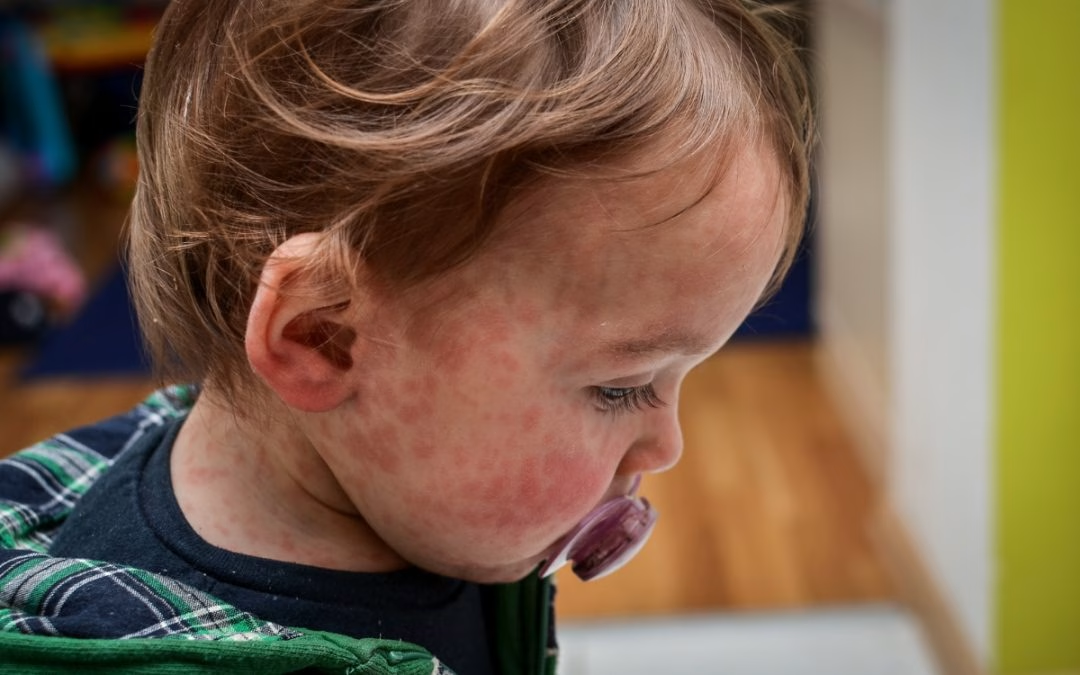
As you enjoy a perfect spring afternoon picking up sweet treats from Buttermilk Sky Pie Shop or visiting the shops around Knoxville, it’s easy to forget that a serious health concern is growing across parts of the United States: a rising number of measles cases. Recent outbreaks in states like Texas, Oklahoma, and New Mexico have reignited concerns about this highly contagious virus, making it crucial to know the symptoms, how to prevent it, and when to seek medical care.
At AFC Knoxville, we’re committed to keeping our community safe and healthy. Here’s what you need to know about measles and how we can help.
What is Measles?
Measles, also known as rubeola, is a highly contagious viral infection that primarily affects the respiratory system. It spreads through the air when an infected person coughs, sneezes, or even breathes. The virus can linger in the air or on surfaces for up to two hours after an infected individual leaves the area, meaning you don’t have to be in direct contact to become infected.
Before vaccines became widely available, measles was a common childhood illness. Thanks to vaccination efforts, measles was declared eliminated in the United States in 2000. However, the disease has resurfaced in recent years due to declining vaccination rates and increased international travel.
What Are the Symptoms of Measles?
Symptoms usually appear about 7–14 days after exposure to the virus. Measles often begins with symptoms similar to a severe cold, but it progresses quickly and can lead to serious complications.
Common symptoms include:
- High fever, often over 101°F
- Cough, runny nose, and red, watery eyes (known as the “three C’s”)
- Tiny white spots inside the mouth (Koplik spots), appearing early in the illness
- Red rash that typically starts on the face and spreads downward across the body 3–5 days after the fever begins
Measles can lead to serious health problems, especially in young children, pregnant women, and people with weakened immune systems. Potential complications include pneumonia, brain swelling (encephalitis), and, in some cases, death.
Why Are Measles Cases Increasing?
The resurgence of measles is largely linked to lower vaccination rates. While the MMR (measles, mumps, and rubella) vaccine is highly effective, hesitancy fueled by misinformation, limited access to healthcare, and disruptions during the COVID-19 pandemic have left many communities vulnerable.
Measles is so contagious that if one person is infected, up to 90% of nearby unvaccinated individuals will also become infected. International travel has also contributed to outbreaks, as measles remains common in some countries and can easily spread across borders.
How Does Measles Spread?
Understanding how measles spreads is key to preventing it. The virus can be transmitted through:
- Airborne particles from coughs and sneezes
- Contaminated surfaces, where the virus can survive for several hours
- Direct contact with an infected person or their belongings
Even short-term exposure in places like shopping centers, museums, or crowded events can be enough for transmission.
How to Prevent Measles
Fortunately, measles is preventable through a few key measures:
Vaccination
The MMR vaccine remains the most effective way to prevent measles. Two doses are about 97% effective at protecting against the virus. Children should receive their first dose between 12–15 months of age and the second dose between 4–6 years of age.
At AFC Knoxville, we offer MMR vaccinations and can review your immunization records to ensure you and your family are fully protected.
Good Hygiene Practices
Washing hands frequently, wearing a mask in crowded areas, and disinfecting surfaces can also help reduce the risk of transmission, especially during outbreaks.
Isolation of Infected Individuals
If someone shows symptoms of measles, isolating them immediately and contacting an AFC healthcare provider can help limit the spread of the virus to others.
When to Seek Medical Care
If you or your child develops symptoms consistent with measles, especially a high fever, cough, red eyes, and a spreading rash, seek medical care promptly. Early diagnosis is important, not only for appropriate treatment but also to prevent exposing others to the virus.
You should also seek medical care if:
- You are exposed to someone with measles and are unsure about your vaccination status
- You or your child has a weakened immune system and may be at greater risk for complications
- You have traveled internationally recently and develop symptoms
At AFC Knoxville, our experienced providers can evaluate symptoms, offer testing if needed, and help you take the necessary steps to recover safely and protect your community.
How AFC Knoxville Can Help
Our clinic is proud to support our community with fast, convenient healthcare services. We offer:
- MMR vaccinations for children and adults
- Immunization record reviews to ensure you are up to date
- Prompt evaluation and care for those experiencing symptoms
- Guidance on isolation and recovery if measles is suspected
We welcome walk-ins and offer extended hours to fit your busy schedule, so you can get the care you need without the long wait.
Final Takeaway
The recent rise in measles cases serves as a reminder that vaccination is not just about protecting yourself, it’s about protecting your neighbors, friends, and community members, too.
Recognizing the symptoms early, staying up to date on vaccinations, and seeking prompt medical care when needed are essential steps to keeping Knoxville safe and healthy. If you have any concerns about measles or need help with vaccinations, AFC Knoxville is here for you. Stop by or schedule an appointment today, together, we can keep our community strong.